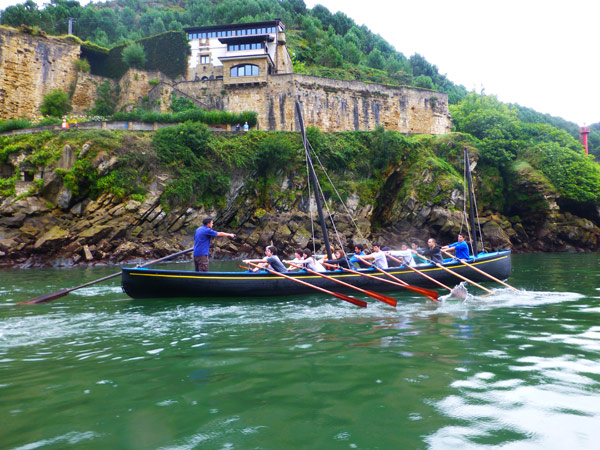basque heritage worldwide

09/10/2013

ADVERTISING
Vitoria-Gasteiz. All together without missing a beat, there they were last Saturday the participants in the musical “master class” Gaztemundu 2013. Only this time, instead of playing songs they were rowing in the Bay of Pasaia, on the trainera Ameriketatik. Something that they discovered requires as much discipline and harmony as playing in a musical group.
It was one of their recreational activities that this group of 15 musicians from the US, Argentina and Chile participated in during their free time. During the week they dedicate their mornings to perfecting playing techniques of txistu, alboka, txalaparta, and pander at the Musika Etxea in Gasteiz.
Good Music Level
“Their level is rather good,” Eneko Espino, txistu professor, told EuskalKultura.com. “We ask that candidates send in a video of them playing and that is how we get to know the level that each one possesses, in order to group them accordingly, because otherwise it would be impossible to teach them to play an instrument in 10 days.

[Gaztemundu 2013 participants in Pasaia in front of the trainera Ameriketatik (photo Gaztemundu)]
Many of the participants are musicians and have been formally trained, which is allowing them to take full advantage of classes provided. “We give individual classes to each one of them and then we play as a group,” said Espino. Some afternoons the students have participated in the “Dantza-plaza,” playing and dancing along with folks that gather in the Machete Plaza in Gasteiz. “it is very important to know Basque dances and know how to accompany the dantzaris because it is one of the activities that they carry out in the euskal etxeak.”

[Some of the Gaztemundu 2013 participants during their visit of the Casa de Juntas in Gernika (photo Gaztemundu)]
That is what Pilar Shortsleeve, does for example, member of the Utah Basque Club who plays for the club’s dance group, Utahko Triskalariak. “They are always wanting to learn new things and they will really like what I am learning here,” says this American in her Basque from Gernika that she learned from her parents.
Pilar, criminologist by profession, learned the txistu on her own but now is very capable of teaching others; one of the goals of this “Master Class” “When I get home there are a couple of people who are interested in learning and I hope more people join in,” she says.
ADVERTISING
ADVERTISING
ADVERTISING
ADVERTISING
ADVERTISING
© 2014 - 2019 Basque Heritage Elkartea
Bera Bera 73
20009 Donostia / San Sebastián
Tel: (+34) 943 316170
Email: info@euskalkultura.eus